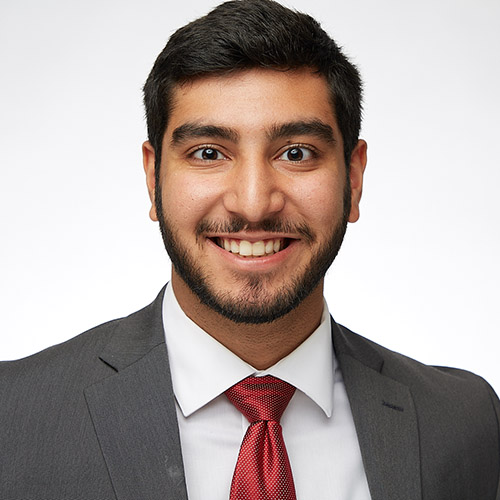


By mastering the enduring principles that underlie financial markets, MSF students in the Seidner Department of Finance broaden their career opportunities and make names for themselves in their fields. Our program emphasizes financial analytical skills that students can bring to workplaces in corporate finance, asset management, and investment banking.
The program requires 10 courses.
Full-time students have 12 months to complete the program while part-time students will take approximately 20 months.
All M.S. in Finance students are required to complete 10 hours of community service in order to graduate.
212,000+
Boston College Alumni
43,000+
Carroll School Alumni
#9 in Finance
U.S. News & World Report Business School Specialty Rankings
2026 Program Update: We are excited to launch a pilot initiative that allows full-time MSF applicants to begin the Quantitative Finance track in the Spring 2026 semester. This new entry point provides added flexibility beyond the traditional fall start. Please note that enrollment for this cohort will be limited. View more program details in the “Full-Time: Quantitative Finance Track” tab below.
7
Core Courses
3
Elective Courses
*Electives must be 6000- and/or 8000-level electives in the Finance department (MFIN). Finance department 7000-level courses are for MBA students only. Electives may have more than one pre-requisite. Please check Agora under "Course Information and Schedules" for specifics.
8
Core Courses
2
Elective Courses
Select two summer courses
Term 1
Term 2
Select four fall courses
Reminder: Quantitative Finance track students must complete Investments, Corporate Finance, Management of Financial Institutions, and Financial Econometrics, along with four additional core courses and two electives.
* Please Note: Students can earn credit for MFIN8855: Cross Asset Valuation Across Global Markets OR MFIN8845: Global Financial Markets, not both.
** Please Note: Students can earn credit for MFIN8869: Fundamental Analysis OR MFIN6665: Applied Fundamental Analysis, not both.
Select four of the following core courses and two electives
* Please Note: Students can earn credit for MFIN8855: Cross Asset Valuation Across Global Markets OR MFIN8845: Global Financial Markets, not both.
** Electives must be 6000- and/or 8000-level electives in the Finance department (MFIN). Finance department 7000-level courses are for MBA students only. Electives may have more than one pre-requisite. Please check Agora under "Course Information and Schedules" for specifics.
Boston College’s Master of Science in Finance (MSF) Quantitative Finance Track is a STEM (science, technology, engineering and math) designated program. This classification allows international MSF graduates on an F-1 visa to potentially qualify for an additional 24 months of training in their field of study (called Optional Practical Training or OPT) beyond the standard 12 months. Eligible F-1 nonimmigrant students with a STEM degree from a Student & Exchange Visitor Program (SEVP) certified U.S. school who participate in an initial period of regular post-completion OPT (typically 12 months) may be eligible to apply for a STEM OPT extension.
To qualify for a 24-month STEM OPT extension, an F-1 student must:
7
Credit-Bearing Core Courses
3
Elective Courses
* As Investments and Corporate Finance are prerequisite courses for most other finance classes, students should plan to take these courses first.
** This is a zero-credit, self-paced online course. All part-Time MSF students are required to take this course in their first semester.
*Electives must be 6000- and/or 8000-level electives in the Finance department (MFIN). Finance department 7000-level courses are for MBA students only. Electives may have more than one pre-requisite. Please check Agora under "Course Information and Schedules" for specifics.
Please Note: Students cannot earn credit for both MFIN8850: Global Macro and the Financial System and MFIN8855: Cross Asset Valuation Across Global Markets. Only one of these classes may be taken for credit.
Course Information and Schedules
Incoming students who took an MSF core course as an undergraduate may be eligible to waive the course, and to replace it with an elective, by passing a waiver exam. Waiver exams must be completed no later than the deadline of August 1. Incoming students requesting a course waiver must submit requests to Professor Michael Barry. Students will be notified of the results of their waiver exam prior to the start of the Fall semester.
MSF students who received an undergraduate degree from Boston College and who achieved a minimum grade of B+ in an MSF core course taken at Boston College will be allowed to replace that course with an elective, provided they have taken the course within the past five years. Students who received a grade of B or lower or who took the course more than five years prior to starting the MSF program may take a waiver exam or they may retake the course with a professor other than the one who taught their undergraduate course. For more information, please contact the Graduate Programs Office at 617-552-3773 or gsomstsv@bc.edu.
The Carroll School has a proud tradition of service to our community. In keeping with that tradition and with our Jesuit heritage, all M.S. in Finance students are required to complete 10 hours of community service in order to graduate.
| Average Undergraduate GPA | 3.45 |
| Average GMAT Score (current format, “Focus Edition”) | 648 |
| Average GMAT Score (previous format, “10th Edition”) | 675 |
| Average GRE | 325 |
| Average Full-Time Work Experience | <1 year |
| Work Experience (middle 80%) | 0.2–2.2 years |
| Women | 27% |
| AHANA* | 15% |
| International | 47% |
| Average Age | 23 |
| Age Range | 21–32 |
*African-American, Hispanic, Asian, and Native American.
Note: All class profile information is accurate as of September 5, 2025
Bolivia
Brazil
Canada
China
Germany
India
Italy
Kuwait
Lebanon
Mexico
Morocco
Nicaragua
Serbia
Sweden
Taiwan
Turkey
Venezuela
Vietnam
| Average Undergraduate GPA | 3.39 |
| Average Full-Time Work Experience | 7 years |
| Women | 39% |
| AHANA* | 23% |
| Average Age | 30 |
| Age Range | 21-47 |
*African-American, Hispanic, Asian, and Native American.
Note: All class profile information is accurate as of September 5, 2025
An MSF from the Carroll School is an excellent investment in your future. We offer merit-based scholarships and financial assistance to qualified applicants. Loan and work study programs are also available.

“The professors are what make Boston College unique. They are some of the top minds in their fields, with extensive academic and professional achievements.”

“The MSF program’s unique blend of theory and practical learning was what really attracted me. Many of my professors had years of industry experience, bringing real-world insights directly into the classroom. This allowed me to gain hands-on understanding while still in an academic setting.”

“The rigorous BC MSF coursework strengthened my technical skills, such as financial modeling and quantitative analysis, and gave me exposure to writing effective research papers in finance, analyzing financial statements, reading and writing comprehensive case reports, and practicing presentation skills—all of which are directly applicable to my current role.”

“The BC MSF played a significant role in helping me secure my current role. During the interview process, I had a series of technical questions that matched what I learned in the classroom, and I was also able to reference my portfolio management projects from the program.”
Chat with a current student and learn more about the BC MSF program.
Enjoy a 30-minute walking tour of Fulton Hall and upper campus.
Application Fee: All applicants are required to pay a nonrefundable application fee of $100 USD.
Admission Decisions: Applications are generally reviewed on a rolling basis. This means that, provided their applications are complete, applicants may receive admission decisions before the notification deadlines. However, it is important for applicants to understand that decisions are only guaranteed by the official notification date.
Rounds & Final Deadlines: For priority consideration, applicants must submit their applications by the earliest date possible. Applications received after the last deadline are reviewed on a space-available basis.
| Program Start Date | Apply By | Receive Decision By |
|---|---|---|
| Spring 2026 (Quantitative Track Only) | October 14, 2025* | December 3, 2025 |
| December 16, 2025 | Rolling+ | |
| August 2026 (Regular Track & Quantitative Track) | October 14, 2025 | December 3, 2025 |
| January 13, 2026* | February 25, 2026 | |
| March 10, 2026* | May 27, 2026 | |
| May 12, 2026 | June 24, 2026 | |
| June 9, 2026 | July 8, 2026 |
| Program Start Date | Apply By | Receive Decision By |
|---|---|---|
| January 2026 | October 14, 2025 | December 3, 2025 |
| December 16, 2025 | Rolling+ | |
| August 2026 | January 20, 2026 | March 25, 2026 |
| March 3, 2026 | May 13, 2026 | |
| July 7, 2026 | August 5, 2026 |
* International applicants are strongly encouraged to apply by these deadlines.
+ Rolling notification date: Candidates with complete applications, which include the receipt of letters of recommendation, will receive decisions within ten business days.
Boston College undergraduates currently in the second semester of their junior year or at any point in their senior year are eligible to apply to the Master of Science in Finance program as fifth-year applicants. Once enrolled, students can complete their MSA or MSF degree in as little as nine months from the program start date.
Use this component of the application to outline your educational background and professional experience, including part-time and internship roles with months and years in each position.
✓ Application Tip: We recommend limiting your resume to one to two pages. Please also make sure that your resume corresponds to the information submitted in the “Employment” section of your online application.
All applicants must possess a four-year bachelor’s degree from an accredited college or university. You must submit transcripts from every institution where you were enrolled in a degree-granting program. At the time of application, only a self-reported transcript is required but if you are admitted, we will require an official transcript sent directly from your degree-granting institution. Transcripts should include:
Course names
All grades received (including transfer credits and study abroad programs)
Cumulative GPA
Degree conferral information
Graduates of non-U.S. institutions must possess a college or university degree equivalent to a four-year U.S. bachelor’s degree. If admitted, international students are required to submit an official English translation of all academic credentials, along with a third-party degree verification from an agency such as SpanTran/TEC or World Education Services (WES).
✓ Application Tip: Verify that your degree is equivalent to a four-year U.S. bachelor’s degree before starting your application. Agencies such as WES provide a variety of degree equivalency tools and services.
Applicants must submit GMAT or GRE scores from within the past five years. We accept both the GMAT Exam and GMAT Focus Edition. Our test codes are:
GMAT school code: 44x-J5-96
GRE school code: 3033
GMAT/GRE Waivers
Full-time MSF applicants may request consideration for a GMAT/GRE waiver. Learn more and submit a full-time MSF GMAT/GRE waiver request before completing your application.
Part-time MSF candidates may also request consideration for a GMAT/GRE waiver. Learn more and submit a part-time MSF GMAT/GRE waiver request before completing your application.
✓ Application Tip: While Graduate Admissions does not have a preference between the GMAT or GRE, we encourage you to consult class profile data for average test scores in order to gauge where you stand.
If you are not a U.S. citizen or permanent resident, you are required to submit an English language proficiency exam score with your application. We accept TOEFL, IELTS, or PTE scores. We do not accept the Duolingo English Test.
Scores must be from within the past two years, and applicants must meet the following minimum scores:
TOEFL, iBT, and TOEFL iBT Home Edition: 100
IELTS: 7.5
PTE: 68
You are eligible to waive the language test requirement if you meet either of the following criteria:
You have completed a four-year bachelor’s degree or a two-year master’s degree (or higher) at an institution where the medium language of instruction is English. You must have completed your degree in its entirety at the English-medium institution. The medium language of instruction must be indicated on your transcript or verified in an official letter from the institution.
You have worked in a full-time, post-degree position for at least two years in the United States or a country where English is an official language. NOTE: Working for a company that conducts its business in English in a country where English is not an official language will not qualify you for a language test waiver.
✓ Application Tip: If you are eligible to waive the language test requirement, you do not need to submit a waiver request beforehand and can simply move forward with your application.
Only one letter of recommendation is required to complete your application, though we will accept up to three letters.
We are interested in learning about you from an individual who can provide an objective appraisal of your capacity for intensive graduate study and your potential for professional success.
Recommenders are required to submit the recommendation forms online and will receive instructions through email once you complete the “Recommendation” section of your application.
✓ Application Tip: MSF applicants are advised to submit recommendations from either academic references such as professors, or professional references such as supervisors or managers.
All applicants must submit a required essay of no more than 500 words telling us about your past experiences, short- and long-term goals, and why you want to pursue an MSF at Boston College. You may also submit an optional essay that addresses aspects of your candidacy that have not already been covered in other parts of the application.
✓ Application Tip: We want to hear about you and appreciate when applicants craft a unique response to the questions. Learn more about our essay questions and how to answer them.
If you have any further application-related questions, we encourage you to register for an App-y Hour application support session. These small-group sessions are held through Zoom and led by a member of the Graduate Admissions team.
Thinking about your fit for Carroll School of Management graduate programs? Review some tips and tactics to assess your candidacy.
You can also email us at bcmba@bc.edu, or schedule a phone call or Zoom appointment with a member of the Graduate Admission team.